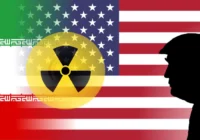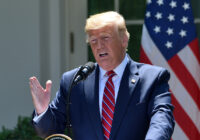It all began with Trump 1.0 in November 2016, an earthquake that produced a deep rift in the political landscape. It shattered many of the precious objects that weren’t fixed to the walls of our political palaces. Eight years later, our planet finds itself reeling under the tsunami we call Trump 2.0, provoked by that initial tremor but whose force has been amplified by the delay.
Earthquakes do monumental local damage, sometimes defacing entire cities. A powerful tsunami can be far more destructive. It can spread damage across the full expanse of an ocean and flood faraway shores. Who doesn’t remember the drama in 2004 when a powerful earthquake located near Sumatra in Indonesia ended up wreaking havoc on the coast of Africa?
An ancient proverb informs us: “it’s an ill wind that blows nobody any good.” This sums up what every stock market wizard knows: Clever traders profit most by buying after the market has crashed. For many, at least in the media, Trump 1.0 was the ill wind that would make their day.
Although the dominantly Democratic corporate media in the United States saw Trump’s 2016 presidential election as an unparalleled catastrophe for the nation, its pundits and late-night comedians realized that for them it was a windfall. The public was aching to hear the worst about their newly elected leader. Hating, deriding, mocking and deconstructing Trump became a source of income and notoriety for a lot of people.
Heather Cox Richardson, a popular Substack author, stands out as an interesting example. Building on her reputation as a historian specialized in the 19th century and the American Civil War, she seized the opportunity to instruct devastated Democrats and moderates about the true meaning of the Trump tsunami. After some success with Facebook, when she moved to Substack she discovered a platform capable of turning her into an authentic influencer.
She quickly learned the trick of drawing on her historical knowledge to cite parallels across time. Trump had offered the nation the perspective of a new civil war, the perfect occasion for Richardson to offer her services as an indispensable illuminator of the Trump phenomenon. Her claim to gravitas as a published author led her followers to see in her a fountain of historical truth and accurate contemporary analysis.
But when she isn’t dealing with history but ongoing events, how subtle are her observations, how refined her analysis? Not quite up to academic standards, it appears.
In Richardson’s February 16 edition of “Letters from an American,” she attempts to review the events surrounding US Vice President JD Vance’s controversial speech at the Munich Security Conference. In guise of a conclusion, rather than producing any original insight, she approvingly quotes political scientist Stathis Kalyvas. “The U.S. government has been taken over by a clique of extremists who have embarked on a process of regime change in the world’s oldest democracy…. The arrogance on display is staggering.”
A bit further on, in an attempt to clarify the question of war and peace that the Trump administration has dared to raise as a question deserving diplomatic attention, she cites Republican Senate Armed Services Chair Roger Wicker, with whom she clearly agrees.
“There are good guys and bad guys in this war, and the Russians are the bad guys. They invaded, contrary to almost every international law, and they should be defeated.”
Today’s Weekly Devil’s Dictionary definition:
Bad guys:
People who have caused serious problems, often involving death and serious destruction, to the exclusion of ourselves.
Contextual note
Can a serious historian like Richardson really believe any conflict is reducible to a contest between “good guys” and “bad guys?” In her books, she blames the South for its commitment to the obviously immoral and anti-democratic institution of slavery, which allows her to frame the Confederates as the party whose actions justified a war initiated by US President Abraham Lincoln’s government. In that sense, the Americans wearing gray uniforms were the bad guys.
But not all wars can be justified by such a stark contradiction with the purported values of a democratic nation. Adolf Hitler’s Nazi government provided an even more clear-cut case to justify going to battle against bad guys. For most citizens of the contemporary liberal democratic order the US Civil War and World War II, despite the obscene levels of destruction in both, stand as two feel-good conflicts in the minds. Both contain obvious examples of fighting to defeat political intentions easily recognizable not just as bad but as morally evil.
But does that mean that all the “guys” involved on one side and the other were respectively good or bad? Should all their actions and beliefs fall into one of those two categories? Propaganda tends to promote that idea. When a conflict is raging, it’s reassuring to think of oneself and one’s countrymen as the good guys. Ordinary citizens and even media pundits are likely to think that way. But historians?
Many critics of the Biden administration’s Ukraine policy have painstakingly pointed out that the US may have been guilty of a significant amount of “bad guy” behavior that has been playing out over decades. The most egregious piece of concrete evidence is the intercepted phone call in 2014 between Assistant Secretary of State Victoria Nuland and Ambassador Geoffrey Pyatt in Kiev. Scott Horton’s recent book, Provoked, recounts the entire concatenation of missteps over decades that led to the events of February 2022. Any honest observer who has examined the evidence will probably conclude that no group of either pristine good guys or committed bad guys emerges. If anything, and this might be the most embarrassing realization for someone like Richardson, both Ukraine and Russia emerge as victims, and therefore “good guys.” In such a scenario, it isn’t difficult to imagine who the bad guys might be.
After seemingly applauding Representative Wicker’s assessment of who’s good and who’s bad, Richardson seems to approve uncritically the congressman’s complementary observation asserting that “Ukraine is entitled to the promises that the world made to it.” Has she considered the meaning of such a claim? Can a historian seriously believe that any country is “entitled to promises?” Does the idea make sense, linguistically, politically or morally?
And what does Wicker or Richardson assume is the “world” that made those promises? An examination of the declarations and behavior of nations across the globe demonstrates that, at best, “the world” Wicker refers to is essentially the US and its European allies. Does Richardson equate NATO with the world? It would seem so.
Historical note
Most moral systems acknowledge that good and evil are two competing forces in the world that play out in actual human behavior. Which means that bad guys do exist, and not only as a pretext allowing the US to mount a new military adventure. If you followed the State Department’s operating manual, Saddam Hussein, Muammar Gaddafi and Bashar al-Assad were “bad guys.” In their own time, so were Mohammad Mosaddegh, Jacobo Árbenz, Patrice Lumumba, Vietnamese Ngô Đình Diệm, Ho Chi Minh, Salvador Allende, Manuel Noriega, Manuel Zelaya and Evo Morales. Some paradoxically had been trusted friends of the good guys before seeing their identity changed to that of confirmed enemy or “bad guy.”
Hitler and the Nazis had the merit of giving the distinction between good guys and bad guys some discernible meaning. The Fuhrer’s unbridled territorial expansionism and overt racism provided a template for the image of an unequivocal bad guy. But think about this: Does it make sense to consider the forces that fire-bombed hundreds of thousands of civilians in Dresden and Tokyo before nuking Hiroshima and Nagasaki as “good guys?” A Civil War general about whom Richardson has written proclaimed, “War is hell.” This presumably acknowledges that good guys may sometimes become bad guys in the process.
Historians are trained to look beyond jingoistic justifications nations put forward in times of war or preparation for war. Instead, they grapple with the context from which conflicts emerge. Such exploration rarely leads to a verdict permitting to separate the good guys from the bad guys. If Richardson truly wishes to maintain her standing as a respected historian, with her eye on the facts, she would seek to avoid appealing to such simplistic binary representations of reality. Apparently, she finds it more rewarding to hone her image as a newsletter blogger.
*[In the age of Oscar Wilde and Mark Twain, another American wit, the journalist Ambrose Bierce produced a series of satirical definitions of commonly used terms, throwing light on their hidden meanings in real discourse. Bierce eventually collected and published them as a book, The Devil’s Dictionary, in 1911. We have shamelessly appropriated his title in the interest of continuing his wholesome pedagogical effort to enlighten generations of readers of the news. Read more of Fair Observer Devil’s Dictionary.]
[Lee Thompson-Kolar edited this piece.]
The views expressed in this article are the author’s own and do not necessarily reflect Fair Observer’s editorial policy.
Support Fair Observer
We rely on your support for our independence, diversity and quality.
For more than 10 years, Fair Observer has been free, fair and independent. No billionaire owns us, no advertisers control us. We are a reader-supported nonprofit. Unlike many other publications, we keep our content free for readers regardless of where they live or whether they can afford to pay. We have no paywalls and no ads.
In the post-truth era of fake news, echo chambers and filter bubbles, we publish a plurality of perspectives from around the world. Anyone can publish with us, but everyone goes through a rigorous editorial process. So, you get fact-checked, well-reasoned content instead of noise.
We publish 2,500+ voices from 90+ countries. We also conduct education and training programs
on subjects ranging from digital media and journalism to writing and critical thinking. This
doesn’t come cheap. Servers, editors, trainers and web developers cost
money.
Please consider supporting us on a regular basis as a recurring donor or a
sustaining member.
Will you support FO’s journalism?
We rely on your support for our independence, diversity and quality.







Comment